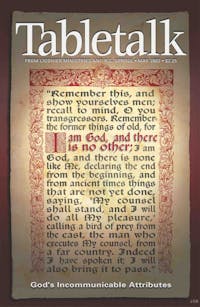
Request your free, three-month trial to Tabletalk magazine. You’ll receive the print issue monthly and gain immediate digital access to decades of archives. This trial is risk-free. No credit card required.
Try Tabletalk NowAlready receive Tabletalk magazine every month?
Verify your email address to gain unlimited access.
In The Character of God: Discovering the God Who Is, Dr. R.C. Sproul explores the character and attributes of God. Writing in a manner anyone can understand, Sproul explains important theological concepts such as God’s righteous justice, omnipotence, omniscience, immutability, and aseity (His self-existence).
The book is an exploration of historic Christian doctrines. Sproul shows that doctrine (teaching) is not a mere academic enterprise but is precisely what is needed for one to grow in the Christian faith. He shows that a believer cannot grow in the faith without first understanding the character of God, for what we think about God determines everything else in our lives. As Sproul explains:
“Before we can respond to the divine summons of discipleship or before we can heed the vocation that God gives us, we must grasp something of the character of the God who is calling us. Our commitment to our mission is only as solid as our understanding of the One who sends us on that mission.”
Sproul explains that the attributes of God are both objectively true and existentially meaningful. One can not love or obey a God he or she knows nothing about. And throughout the book, Sproul shows how each attribute ought to affect the Christian life.
For example, Sproul explains God’s aseity, the attribute that has to do with His self-existence. In the created world, everything is ultimately caused or created by something else. God, however, does not have the same kind of being humans have. No one made God. He has always been eternally self-existent. In fact, Sproul notes that the word existence is not quite accurate for God.
To further explain this concept, Sproul points to Paul’s words in Acts 17:28a: “For in Him we live and move and have our being.” All life, movement, and existence ultimately rest in God’s self-existence. He sustains all creation and is dependent on nothing. It is in God alone that we live and move and have our being.
Sproul goes on to show how God’s omnipresence is connected to His aseity. God is everywhere present, and yet He is not to be equated with the created world. The kind of being God has and the kind of existence the world has are different. Sproul explains that God’s omnipresence should not be interpreted as pantheism. Nevertheless, God’s aseity and His omnipresence are intimately related. As Sproul states: “The being of God pervades the world and holds it together. How this happens is as mysterious as the how of creation. We must rest in our understanding that the how of creation and the sustaining of creation are found in the self-existing power of the Creator.”
Throughout the work, Sproul explains how all of God’s attributes are connected. They are to be seen as a collective whole, and are not to be reduced to one attribute. Following 1 John 4:8 (“God is love”), many Christians want to reduce God to the attribute love. This is a strong temptation for many who seek to escape God’s justice or who fear His holy wrath. But we cannot make an absolute identity between God and love. To do so would be the same as saying “love is God,” which would be false. Instead, Sproul reminds Christians that love is of God. We do have a loving God. And Christians ought to love one another as a demonstration of God’s love to them.
God’s love can be seen in His righteous justice. There is nothing remote or abstract about the righteousness of God. Sproul explains that because God is righteous and has authority over everyone, no one has the right to do what is wrong. The Bible, of course, tells us that apart from Christ’s righteousness, no one is righteous or acceptable to God. The doctrine of justification, therefore, is at the heart of the Christian faith. In The Character of God, Sproul explicates the historical Protestant understanding of justification by faith, showing that fallen men and women are justified by Christ’s imputed righteousness credited to their account through faith alone. Sinful people are made righteous because of the righteousness of Christ. The doctrine of justification is at the heart of the Christian faith because it is precisely the imputed righteousness of Christ that redeems fallen men and women, and reconciles them to God. Furthermore, the doctrine of justification through faith alone sets Christianity apart from every other world religion.
For readers of Tabletalk and of Sproul’s books, many of these concepts will be familiar. Throughout the years, Sproul has expressed a passionate concern for helping others understand the grandeur and majesty of almighty God. Those new to Sproul’s teachings will find a source for understanding the character of God that goes far beyond what is often found in popular evangelicalism these days. All readers, however, will be delighted and challenged as Sproul explicates some of the greatest themes of the Christian faith. The Character of God is published by Vine Books.
